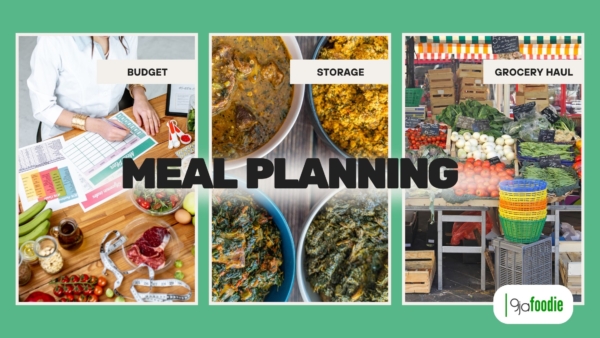In our current economic landscape, saving time and funds as much as possible has become essential, and meal planning is one of the most critical tools to structure an individual’s or family’s lifestyle around to avoid waste and prepare delicious dishes on a tight budget. As Nigerians, we are all used to our parents or guardians bulk-buying groceries periodically, cooking as much as possible, and dividing and storing them in the fridge for an extended period of time.
In this article, we’ll look at the benefits of meal planning and offer practical advice for developing a budget-friendly meal plan that works for individuals and families.
Understanding Your Dietary Needs:
- Before starting any meal planning, you must understand what food you and everyone else in your household enjoy.
- Take note of dietary requirements in terms of dietary-related health conditions. Do you have children or a person with diabetes in the household? Ensure your meals are balanced and packed with nutrients.
Setting a Budget:
- Establish a weekly or monthly budget that matches your income and expenses. This budget will be divided into essential funds for groceries, dining out, and occasional treats.
- Be sure to keep your ears out and research the prices at local markets so you can adjust your budget accordingly.
Making meal plans ahead of time:
- Take some time this week to plan your meals for the next week or month. For ideas and motivation, use the Internet. Check out 9jafoodie for meal prep inspirations, LoseItNigeran for health meal plans, cookbooks, or other cooking apps.
- Strive for various meals to prevent monotony and ensure you receive a diverse array of nutrients.
Creating a Grocery Shopping List:
- You should make a shopping list of the essential ingredients based on your planned meals. To avoid making needless purchases, look through your pantry and refrigerator to see what you currently have.
- When you go shopping, make sure to stick to your list so that you can avoid making impulsive purchases and stay within your means.
Consider Batch Cooking and Meal Prep:
- When preparing staple foods like grains, proteins, sauces, and soups, you might want to think about cooking them in more significant quantities in batches.
- For easy storage and reheating of cooked meals, portion them out and place them in containers of the correct size. To streamline the cooking process and maximize time efficiency during busy weekdays, it’s advisable to dedicate a specific day for meal prep.
Be Flexible:
- Maintain a flexible approach to your meal plan and be open to making replacements based on the products that are available and the prices that are affordable.
- Use left-overs creatively to reduce food waste and stretch your budget farther. Don’t be afraid to replace items or adjust recipes based on availability and pricing.
Keeping Track and Re-assess:
- Monitor your food spending and regularly compare it to your budget. Assess how well the meal plan performs in terms of saving money, providing a balanced diet, and overall enjoyment.
- Adjust the meal plan as needed to accommodate feedback and changing preferences.
Planning your meals can be a great way to save money while still enjoying tasty and healthy dishes. By following these practical tips and strategies, anyone can become skilled at meal planning and save money on food without sacrificing taste or quality. Begin your preparations now and enjoy the advantages of a more organized and cost-effective way to handle meal planning.






Leave A Comment